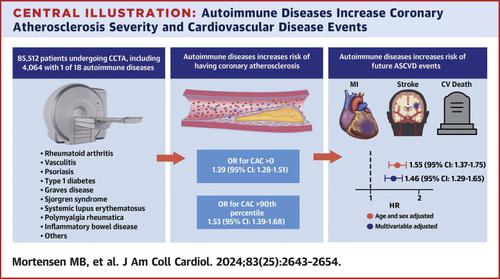当前位置:
X-MOL 学术
›
J. Am. Coll. Cardiol.
›
论文详情
Our official English website, www.x-mol.net, welcomes your
feedback! (Note: you will need to create a separate account there.)
Association of Autoimmune Diseases With Coronary Atherosclerosis Severity and Ischemic Events
Journal of the American College of Cardiology ( IF 21.7 ) Pub Date : 2024-06-17 , DOI: 10.1016/j.jacc.2024.04.030 Martin Bødtker Mortensen 1 , Jesper Møller Jensen 2 , Niels Peter Rønnow Sand 3 , Kristian Kragholm 4 , Michael J Blaha 5 , Erik Lerkevang Grove 2 , Henrik Toft Sørensen 6 , Kevin Olesen 2 , Michael Maeng 7 , Brian Løgstrup 2 , Martin Busk 8 , Ellen Margrethe Hauge 9 , Ann Marie Navar 10 , Hans Erik Bøtker 2 , Bjarne Linde Nørgaard 2
Journal of the American College of Cardiology ( IF 21.7 ) Pub Date : 2024-06-17 , DOI: 10.1016/j.jacc.2024.04.030 Martin Bødtker Mortensen 1 , Jesper Møller Jensen 2 , Niels Peter Rønnow Sand 3 , Kristian Kragholm 4 , Michael J Blaha 5 , Erik Lerkevang Grove 2 , Henrik Toft Sørensen 6 , Kevin Olesen 2 , Michael Maeng 7 , Brian Løgstrup 2 , Martin Busk 8 , Ellen Margrethe Hauge 9 , Ann Marie Navar 10 , Hans Erik Bøtker 2 , Bjarne Linde Nørgaard 2
Affiliation

|
Some autoimmune diseases carry elevated risk for atherosclerotic cardiovascular disease (ASCVD), yet the underlying mechanism and the influence of traditional risk factors remain unclear.
中文翻译:

自身免疫性疾病与冠状动脉粥样硬化严重程度和缺血事件的关系
一些自身免疫性疾病导致动脉粥样硬化性心血管疾病 (ASCVD) 的风险升高,但传统风险因素的潜在机制和影响仍不清楚。
更新日期:2024-06-17
中文翻译:

自身免疫性疾病与冠状动脉粥样硬化严重程度和缺血事件的关系
一些自身免疫性疾病导致动脉粥样硬化性心血管疾病 (ASCVD) 的风险升高,但传统风险因素的潜在机制和影响仍不清楚。

































 京公网安备 11010802027423号
京公网安备 11010802027423号